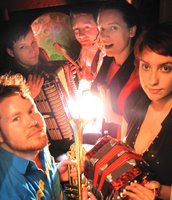 On Sept. 31, a guitar-playing, country-singing, hit-making performer from Down Under came to town, and he made all the girls swoon.
On Sept. 31, a guitar-playing, country-singing, hit-making performer from Down Under came to town, and he made all the girls swoon.Keith Urban’s concert that night was the first of two special shows at the Fox Theatre in Atlanta. It was intended as a gift to his fans, but as signs boasted and cameras proved, the performance was also filmed for broadcast use. Nobody ever told the audience what that use would be, but it was hard to miss the big camera boom floating over the lower level and the cameraman walking around onstage, filming Urban from all angles as he performed.
Perhaps because of the cameras, Urban didn’t move around a lot during his set, and when he did, it looked planned. He nevertheless exuded energy and talent, sounding just as good as he does on his albums—no studio touch-ups needed—and performing most of his hits while flawlessly playing acoustic, bass, and electric guitars. He even hopped behind the piano for one song, though it wasn’t the recent hit ballad “Tonight I Wanna Cry” that his audience expected, but rather a new track from his forthcoming album "Love, Pain, and the Whole Crazy Thing," due out Nov. 7.
Urban, the 2005 Country Music Association Entertainer of the Year, used the concert to debut some of his new music, treating his fans to the first-ever performances of several of his new tracks. “Stupid Boy” was one of the most memorable, and he brought the audience into his living room by pulling out his personal recorder and playing a raw tape of “Faster Car,” recorded as he was writing it at home, and then performing the completed song live.
The concert opened with brand-new song “Once in a Lifetime,” the highest debuting country single in Billboard’s 62-year history, and packed a lot of popular music into its short hour and twenty minutes. “Raining on Sunday” was a high point, with Urban sitting down to play acoustic guitar as passion resonated from his voice. He shone on “You’ll Think of Me” as well, adding an ending so emphatic and so convincingly anguished that you’d never know he recently fell in love and married actress Nicole Kidman.
Though Urban’s strong, entertaining performance more than made up for any initial problems, the show didn’t get off to the best start, beginning 45 minutes late to accommodate people still trying to get in. Because all 4,500 or so tickets were only available at will call, a line stretched all the way down the street and around a corner as people waited patiently just to get their tickets. Inside, two of Urban’s band members came onstage with acoustic guitars and entertained the audience with a couple of impromptu but nonetheless well-sung ‘80s flashback songs.
Everyone in the audience, largely members of Urban’s fan club Monkeyville, who had first dibs on tickets for the event, forgot the delay as soon as Urban stepped onto the stage. They sang loudly and clearly (and surprisingly in tune) whenever Urban would point his microphone in their direction and cheered predictably when he cooed about the “prettiest country/from Georgia to Tennessee” in his song “Who Wouldn’t Want to be Me.” Each time an up-tempo tune began, they sprang enthusiastically to their feet, causing the balcony to shake disturbingly as they danced and making it difficult for everyone without front-row seats to see. As opulent and historically important as the Fox is, it just wasn’t built for this kind of concert.
The setting will surely make for a nice video or TV concert special though, and those in attendance that night won’t remember that they had trouble seeing; they’ll instead recall Urban’s charming Australian accent, his fun, feel-good hits, his emotion-packed ballads, and what it was like to hear it all in person.
—Stephanie Crozier

 As drunken hordes flooded downtown Athens late Saturday night in the aftermath of the Georgia-Tennessee game, an entirely different Southern tradition unfolded within the walls of the 40 Watt Club.
As drunken hordes flooded downtown Athens late Saturday night in the aftermath of the Georgia-Tennessee game, an entirely different Southern tradition unfolded within the walls of the 40 Watt Club.
